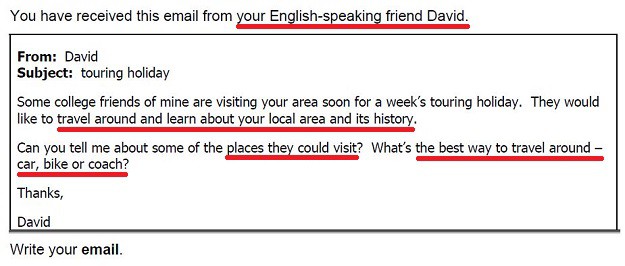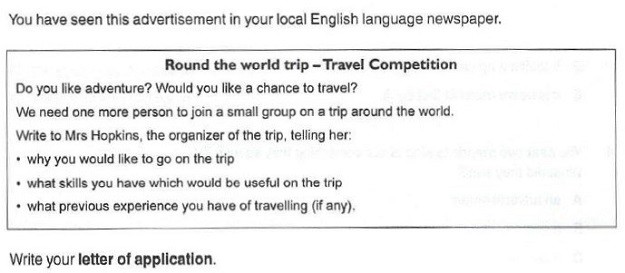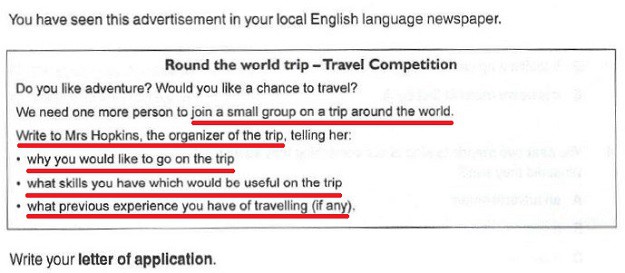 laptop and someone handwriting a letter" width="" height="" />
laptop and someone handwriting a letter" width="" height="" /> laptop and someone handwriting a letter" width="" height="" />
laptop and someone handwriting a letter" width="" height="" />
This is what a typical email writing task in the FCE exam might look like. It is an actual email that you have to reply to and, of course, we can analyse this task in exactly the way described above.
Firstly, we want to see what to include in our email and, secondly, who we are writing to in order to choose the correct register. The best way to do this is to underline the key pieces of information. Because I’m a nice teacher I’ve already completed this step for you:

I’ve underlined the reason why David’s friends are coming to your area (“…travel around and learn about …”), which gives us a general idea of what to write about as well as two very specific things David is asking us to tell him (“places they could visit” and “the best way to travel around”).
On top of that, when you write to a friend like David you have to write in an informal style. Generally speaking, this means that you should use contractions ( e.g. I’m, don’t), colloquial expressions (e.g. tons of, ‘What’s happening?’) as well as phrasal verbs and idioms (end up, ‘Guess what!’). Later in this article I will give you a list with very useful expressions specifically for writing emails and letters so keep reading until the end 🙂 .

After we’ve analysed a typical task to write an email we can now check out one that asks you to write a letter. As you will see, there are similarities and differences between the two options.
Here, we have to do the exact same two things we did with the email writing task: find out what to include in our letter (1) and who is going to read it (2).

And again, the easiest way to do this is by underlining the key pieces of information so you know what to do:
In this task you are going to write a letter of application to Mrs Hopkins. Her first name isn’t mentioned so we need to be polite and choose formal language. This means the opposite of what I told you about the email task above. Do NOT use contractions (‘I am’ instead of I’m), do NOT use colloquial expressions and even rather formal ones (e.g. ‘I am writing in order to …’) and do NOT use phrasal verbs or idioms.
At first, this can feel unnatural and you will have to practise a little bit. I often see contractions and colloquial expressions in formal writing tasks that my students give me to correct because they are not used to being so polite when writing in English. However, don’t worry, just practise formal letters regularly and it will become easier and easier.
In our example task above there are also (surprise!) three topic points that we have to include in our letter: the reason why we are interested in the trip (1), useful skills we have (2) and our previous travel experience (3).
So remember, there are always 2-3 topic points in email/letter writing tasks, but the register is usually informal in emails and formal in letters.

When it comes to organising emails and letters in the FCE exam, we find that, luckily, there aren’t any differences so you can learn for one while practising the other, but let’s look at our example from earlier again:
We remember that there are three topic points in the task so we can already break up our letter into three paragraphs. On top of that, we have to add an opening and closing paragraph and formula simply because that’s what we do in emails and letters (I’m sure the same is done in your native language or country as well.), so we get to five paragraphs.
This pattern works for every single email/letter so try to memorise this. The next time you sit down to practise you will thank your teacher Phill 🙂 .
There is one thing that, unfortunately, too many candidates do wrong when they take the writing exam and even when they practise. By developing this bad habit they often waste a lot of time during the actual test and sometimes lose valuable marks.
Of course, I’m talking about making a plan before you start writing. Take a few minutes to note down the different paragraphs (see the example in the previous section on organising your emails and letters) and add just a few words to help you give your text a logical structure.
You will see how much easier it gets when you can focus on the content of your writing task instead of the organisation and logical order of your ideas.